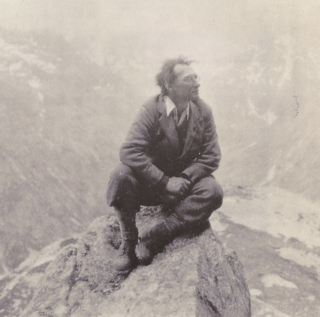
Jules Gabriel Verne was a French novelist, poet, and playwright. His collaboration with the publisher Pierre-Jules Hetzel led to the creation of the Voyages extraordinaires, a series of bestselling adventure novels including Journey to the Center of the Earth (1864), Twenty Thousand Leagues Under the Seas (1870), and Around the World in Eighty Days (1872). His novels, always well documented, are generally set in the second half of the 19th century, taking into account the technological advances of the time.
Philology is the study of language in oral and written historical sources; it is the intersection of textual criticism, literary criticism, history, and linguistics with strong ties to etymology. Philology is also defined as the study of literary texts as well as oral and written records, the establishment of their authenticity and their original form, and the determination of their meaning. A person who pursues this kind of study is known as a philologist. In older usage, especially British, philology is more general, covering comparative and historical linguistics.

Tamil is a Dravidian language natively spoken by the Tamil people of South Asia. Tamil is an official language of the Indian state of Tamil Nadu, the sovereign nations of Sri Lanka and Singapore, and the Indian Union territory of Puducherry. Tamil is also spoken by significant minorities in the four other South Indian states of Kerala, Karnataka, Andhra Pradesh and Telangana, and the Union Territory of the Andaman and Nicobar Islands. It is also spoken by the Tamil diaspora found in many countries, including Malaysia, Myanmar, South Africa, United Kingdom, United States, Canada, Australia and Mauritius. Tamil is also natively spoken by the Sri Lankan Moors. One of 22 scheduled languages in the Constitution of India, Tamil was the first to be classified as a classical language of India.
Feminist literary criticism is literary criticism informed by feminist theory, or more broadly, by the politics of feminism. It uses the principles and ideology of feminism to critique the language of literature. This school of thought seeks to analyze and describe the ways in which literature portrays the narrative of male domination by exploring the economic, social, political, and psychological forces embedded within literature. This way of thinking and criticizing works can be said to have changed the way literary texts are viewed and studied, as well as changing and expanding the canon of what is commonly taught. It is used a lot in Greek myths.

Literary theory is the systematic study of the nature of literature and of the methods for literary analysis. Since the 19th century, literary scholarship includes literary theory and considerations of intellectual history, moral philosophy, social philosophy, and interdisciplinary themes relevant to how people interpret meaning. In the humanities in modern academia, the latter style of literary scholarship is an offshoot of post-structuralism. Consequently, the word theory became an umbrella term for scholarly approaches to reading texts, some of which are informed by strands of semiotics, cultural studies, philosophy of language, and continental philosophy.

Literary criticism is the study, a genre of arts criticism, evaluation, and interpretation of literature. Modern literary criticism is often influenced by literary theory, which is the philosophical discussion of literature's goals and methods. Though the two activities are closely related, literary critics are not always, and have not always been, theorists.

Herman Northrop Frye was a Canadian literary critic and literary theorist, considered one of the most influential of the 20th century.
Criticism is the construction of a judgement about the negative or positive qualities of someone or something. Criticism can range from impromptu comments to a written detailed response. Criticism falls into several overlapping types including "theoretical, practical, impressionistic, affective, prescriptive, or descriptive".

Comparative literature is an academic field dealing with the study of literature and cultural expression across linguistic, national, geographic, and disciplinary boundaries. Comparative literature "performs a role similar to that of the study of international relations but works with languages and artistic traditions, so as to understand cultures 'from the inside'". While most frequently practised with works of different languages, comparative literature may also be performed on works of the same language if the works originate from different nations or cultures in which that language is spoken.
Russian formalism was a school of thought literary theory in Russia from the 1910s to the 1930s. It includes the work of a number of highly influential Russian and Soviet scholars such as Viktor Shklovsky, Yuri Tynianov, Vladimir Propp, Boris Eichenbaum, Roman Jakobson, Boris Tomashevsky, Grigory Gukovsky who revolutionised literary criticism between 1914 and the 1930s by establishing the specificity and autonomy of poetic language and literature. Russian formalism exerted a major influence on thinkers like Mikhail Bakhtin and Juri Lotman, and on structuralism as a whole. The movement's members had a relevant influence on modern literary criticism, as it developed in the structuralist and post-structuralist periods. Under Stalin it became a pejorative term for elitist art.
New Criticism was a formalist movement in literary theory that dominated American literary criticism in the middle decades of the 20th century. It emphasized close reading, particularly of poetry, to discover how a work of literature functioned as a self-contained, self-referential aesthetic object. The movement derived its name from John Crowe Ransom's 1941 book The New Criticism.

Ivor Armstrong Richards CH, known as I. A. Richards, was an English educator, literary critic, poet, and rhetorician. His work contributed to the foundations of the New Criticism, a formalist movement in literary theory which emphasized the close reading of a literary text, especially poetry, in an effort to discover how a work of literature functions as a self-contained and self-referential æsthetic object.
Translation studies is an academic interdiscipline dealing with the systematic study of the theory, description and application of translation, interpreting, and localization. As an interdiscipline, translation studies borrows much from the various fields of study that support translation. These include comparative literature, computer science, history, linguistics, philology, philosophy, semiotics, and terminology.
Darwinian literary studies is a branch of literary criticism that studies literature in the context of evolution by means of natural selection, including gene-culture coevolution. It represents an emerging trend of neo-Darwinian thought in intellectual disciplines beyond those traditionally considered as evolutionary biology: evolutionary psychology, evolutionary anthropology, behavioral ecology, evolutionary developmental psychology, cognitive psychology, affective neuroscience, behavioural genetics, evolutionary epistemology, and other such disciplines.
A literary trope is the use of figurative language, via word, phrase or an image, for artistic effect such as using a figure of speech. Keith and Lundburg describe a trope as "a substitution of a word or phrase by a less literal word or phrase." The word trope has also undergone a semantic change and now also describes commonly recurring or overused literary and rhetorical devices, motifs or clichés in creative works. Literary tropes span almost every category of writing, such as poetry, film, plays, and video games.

Fiction is any creative work, chiefly any narrative work, portraying individuals, events, or places that are imaginary, or in ways that are imaginary. Fictional portrayals are thus inconsistent with history, fact, or plausibility. In a traditional narrow sense, "fiction" refers to written narratives in prose – often referring specifically to novels, novellas, and short stories. More broadly, however, fiction encompasses imaginary narratives expressed in any medium, including not just writings but also live theatrical performances, films, television programs, radio dramas, comics, role-playing games, and video games.

Literature is any collection of written work, but it is also used more narrowly for writings specifically considered to be an art form, especially prose fiction, drama, poetry, and including both print and digital writing. In recent centuries, the definition has expanded to include oral literature, also known as orature much of which has been transcribed. Literature is a method of recording, preserving, and transmitting knowledge and entertainment, and can also have a social, psychological, spiritual, or political role.
English studies is an academic discipline taught in primary, secondary, and post-secondary education in English-speaking countries; it is not to be confused with English taught as a foreign language, which is a distinct discipline. An expert on English studies can be called an Anglicist. The discipline involves the study and exploration of texts created in English literature. English studies include: the study of literature, the majority of which comes from Britain, the United States, and Ireland ; English composition, including writing essays, short stories, and poetry; English language arts, including the study of grammar, usage, and style; and English sociolinguistics, including discourse analysis of written and spoken texts in the English language, the history of the English language, English language learning and teaching, and the study of World of English. English linguistics is usually treated as a distinct discipline, taught in a department of linguistics.
Joseph Carroll is a scholar in the field of literature and evolution. He received his PhD in Comparative Literature from the University of California, Berkeley and is now Curators’ Distinguished Professor Emeritus at the University of Missouri–St. Louis.





